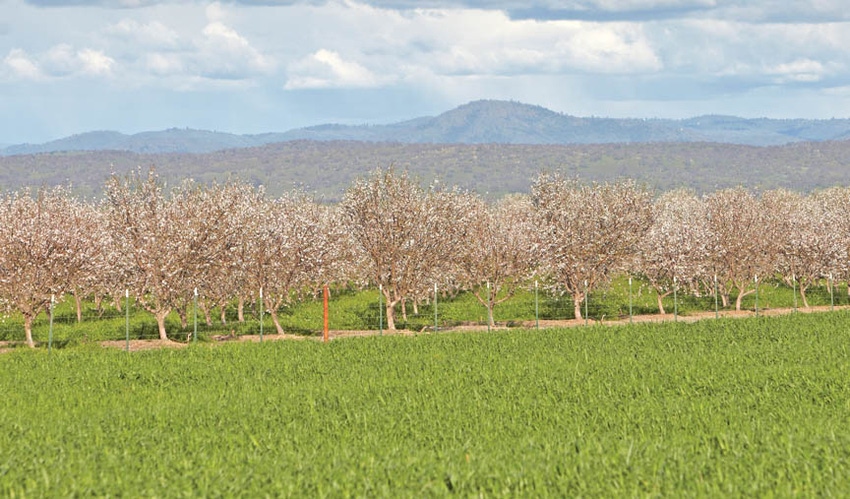
California almonds a positive tale of agricultural water use
More than 90 percent of California almond acreage represented in CASP is irrigated by highly efficient micro-irrigation systems.Self-assessment modules show that the vast majority of growers with irrigation pumps take steps to maintain and test their systems for optimum performance.
November 4, 2011

Two years of cumulative data gathered from grower self-assessments through participation in the California Almond Sustainability Program (CASP) is giving teeth to what we already know about almond growers’ commitment to sustainable irrigation management.
Many of the technologies and strategies used in sustainable practices have evolved from 30-plus years of grower-funded irrigation research by the University of California through the Almond Board of California. They include the use of highly efficient irrigation systems and the installation and maintenance of irrigation system infrastructure to optimize the performance and efficiency of those systems.
Data from the self-assessments also highlights areas of opportunity in which growers can further increase the economic and environmental sustainability of their irrigation management and performance. In doing so, they not only stake a greater claim on the sustainability of their practices, but can also save money and enhance production through the more efficient use of water and other resources.
Here is a sample of what we have learned so far related to sustainable irrigation management taking place in today’s almond orchards based on data submitted by 198 growers representing 36,519 acres:
More than 90 percent of California almond acreage represented in the program is irrigated by highly efficient micro-irrigation systems, such as micro-sprinklers or drip.
Self-assessment modules show that the vast majority of growers with irrigation pumps take steps to maintain and test their systems for optimum performance, including pump efficiency tests, flush and filter checks, and the use of flow meters and pressure gauges.
For micro-irrigated orchards, system performance is additionally enhanced as 65 percent have pressure-compensating emitters, 90 percent are inspected weekly for leaks and clogs, and 87 percent have lines flushed at the start and middle of the season.
Many growers are also using strategies and advanced technology to help them schedule irrigations and fine-tune decisions on the amount and timing of applied water. More than half of growers use soil moisture readings through advanced technology such as neutron probes and tensiometers to help with timing, while 38 percent also incorporated advanced technology to measure plant stress for timing decisions.
Almonds at sustainable forefront
These cumulative findings are encouraging, though not surprising. We know that California almond growers are at the forefront of integrating sustainable strategies and technologies. The California Almond Sustainability Program provides growers and their representatives an opportunity to collectively tell their sustainability story to buyers, consumers and public policy makers.
The program is also designed to create a cycle of continuous improvement for growers to self-assess their current practices, interpret and compare where they lie on the sustainability continuum, and develop plans to further implement sustainable almond farming practices. For instance, although many growers use recommended irrigation system infrastructure, data shows that some may further optimize performance by testing for distribution uniformity more often. Data indicates that distribution uniformity tests were done on fewer than half of the assessed orchards within the last year.
Individualized reports give each participant a snapshot of their use of sustainable practices in comparison to other almond growers throughout the state. Workshops can provide insight into a range of practices and technologies to further improve operational efficiencies.
The Almond Board has set forth an ambitious goal this year of tripling grower participation in CASP to 600 growers. We know that it can be asking a lot for growers to dedicate several hours to participate in an assessment workshop and are working to make the most of growers’ participation.
Based on grower input gleaned through their participation in CASP, the Almond Board and SureHarvest are partnering this year with UC Cooperative Extension, the Community Alliance with Family Farmers and/or private industry to design and implement innovative workshops that will add value for growers.
A number of upcoming workshops will use an expanded format, coupling self-assessment with expert presentations on almond production topics such as irrigation management. The first two workshops will be held on Nov. 18 in Yuba City and Nov. 29 in Woodland. A self-assessment–only workshop will also be held on Dec. 6 in Modesto, prior to the annual Almond Industry Conference.
This year’s conference will illustrate the self-assessment process to growers at an interactive session on Thursday, Dec. 8. Grower participants will use handheld remote controls to answer questions about their practices taken from the pest-management self-assessment module. The session will allow the audience to see the cumulative results and discuss specific practices with an Extension entomologist.
Go to AlmondBoard.com/farmpress23 for more information about workshops. For additional information or questions about the California Almond Sustainability Program, email [email protected] or call the Almond Board office in Modesto at (209) 343-3200. To sign up for a workshop, contact Debye Hunter by email at [email protected] or phone (209) 343-3230.
You May Also Like



